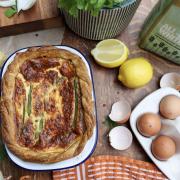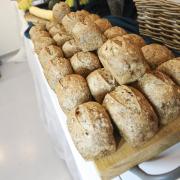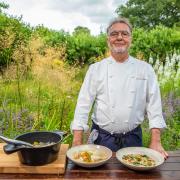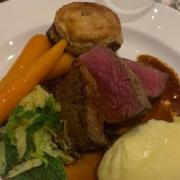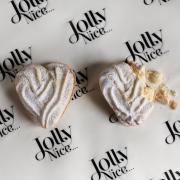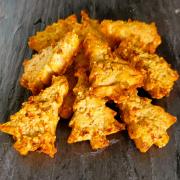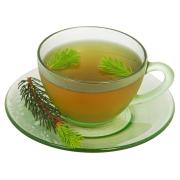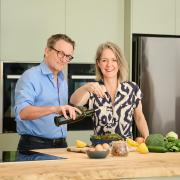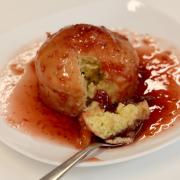Former Tomorrow's World presenter Judith Hann returns to her roots with a cookery course specialising in the use of herbs
There is no easier or more satisfying way to transform food than to use herbs in your cooking. Sales of herbs in greengrocers and supermarkets have doubled over the last couple of years, but the range is still dismally small. Favourite herbs of mine, like lovage, chervil, oregano and sorrel are impossible to find in shops, but they grow like weeds in my garden and they are simple to look after. So why not grow them at home, in the garden or in pots or window boxes?
My herb garden in the South Cotswolds now contains over 100 different types of edible herbs. They make my cooking extra special. No recipe I find in a book is impossible because every culinary herb I have heard of is growing close to the kitchen door. All of them are easy to grow, great to look at and smell, as well as being a magnet for bees and butterflies when there are in flower. I made the walled garden 15 years ago from a run-down area on my small farm, where pigs had once been raised. It now produces so many herbs that I give them away to friends, to favourite chefs nearby and to the local deli.
But the herb garden is now having an even bigger impact on my life. I have started a herb cookery school, called Hann's Herbs, in an elegant listed Cotswold stone barn near the herb garden. The idea began when my younger son Daniel and I were discussing ways of raising money for Leukaemia Research. He had suffered from the disease as a teenager 20 years ago and we wanted to help raise funds. He said: "You've got the best herb garden I have ever seen - and the barn. Why not hold some Herb Days". After running these events for about 30 guests for two years, people were asking me to teach them how to cook with herbs in smaller groups of up to 12. The idea for the cookery school was born.
Food has always been a passion of mine. I have written two books on healthy recipes and presented a food series called The Taste of Health for BBC television. Before I started my 20 years presenting the science programme Tomorrow's World, I wrote a weekly food column for a large newspaper group. A favourite part of my week is inventing new recipes at home using herbs, and all the dishes prepared at the herb cookery school use my original recipes.
I was thrilled when Rick Stein made me a Food Hero for his television series. He had heard about my herb garden and love of cooking. The producer David Pritchard came to the farm and tasted some of my food over dinner. He poked around in the larder sampling the fruit jellies I make with herbs, the vinegars, chilli herb oils and spiced fruits. When we were filming a few weeks later, Chalky, Rick's old dog, famously chased and devoured a wild rabbit that was lurking under the lovage. It made front page news in the Daily Telegraph.
I cannot promise a repeat performance of that to visitors to the cookery school. But everyone enjoys tasting all the herbs from the garden, learning planting skills and seeing herb design ideas in practice. They prepare, cook and enjoy a lavish herb lunch in the barn, using salad herbs, flowers and seeds as well as the more traditional herb leaves. I am helped by Stella Mills, who was a college food lecturer for many years. She is also RHS trained and has a great interest in both growing and cooking herbs.
Everyone gets the chance to see the six acres of magical gardens surrounding the herb garden and barn. The rose garden, water garden, white garden and woodland area are set in 40 acres of typical Cotswold landscape. At the end of a day of both learning and being pampered, my guests can go home with herb plants and seeds, bunches of herbs for cooking, vinegars, oils, herb jellies and other home-made products.
For more details about Judith's courses, email media.advantage@virgin.net or go to the website www.hannsherbs.co.uk
There is no easier or more satisfying way to transform food than to use herbs in your cooking. Sales of herbs in greengrocers and supermarkets have doubled over the last couple of years, but the range is still dismally small. Favourite herbs of mine, like lovage, chervil, oregano and sorrel are impossible to find in shops, but they grow like weeds in my garden and they are simple to look after. So why not grow them at home, in the garden or in pots or window boxes?
My herb garden in the South Cotswolds now contains over 100 different types of edible herbs. They make my cooking extra special. No recipe I find in a book is impossible because every culinary herb I have heard of is growing close to the kitchen door. All of them are easy to grow, great to look at and smell, as well as being a magnet for bees and butterflies when there are in flower. I made the walled garden 15 years ago from a run-down area on my small farm, where pigs had once been raised. It now produces so many herbs that I give them away to friends, to favourite chefs nearby and to the local deli.
But the herb garden is now having an even bigger impact on my life. I have started a herb cookery school, called Hann's Herbs, in an elegant listed Cotswold stone barn near the herb garden. The idea began when my younger son Daniel and I were discussing ways of raising money for Leukaemia Research. He had suffered from the disease as a teenager 20 years ago and we wanted to help raise funds. He said: "You've got the best herb garden I have ever seen - and the barn. Why not hold some Herb Days". After running these events for about 30 guests for two years, people were asking me to teach them how to cook with herbs in smaller groups of up to 12. The idea for the cookery school was born.
Food has always been a passion of mine. I have written two books on healthy recipes and presented a food series called The Taste of Health for BBC television. Before I started my 20 years presenting the science programme Tomorrow's World, I wrote a weekly food column for a large newspaper group. A favourite part of my week is inventing new recipes at home using herbs, and all the dishes prepared at the herb cookery school use my original recipes.
I was thrilled when Rick Stein made me a Food Hero for his television series. He had heard about my herb garden and love of cooking. The producer David Pritchard came to the farm and tasted some of my food over dinner. He poked around in the larder sampling the fruit jellies I make with herbs, the vinegars, chilli herb oils and spiced fruits. When we were filming a few weeks later, Chalky, Rick's old dog, famously chased and devoured a wild rabbit that was lurking under the lovage. It made front page news in the Daily Telegraph.
I cannot promise a repeat performance of that to visitors to the cookery school. But everyone enjoys tasting all the herbs from the garden, learning planting skills and seeing herb design ideas in practice. They prepare, cook and enjoy a lavish herb lunch in the barn, using salad herbs, flowers and seeds as well as the more traditional herb leaves. I am helped by Stella Mills, who was a college food lecturer for many years. She is also RHS trained and has a great interest in both growing and cooking herbs.
Everyone gets the chance to see the six acres of magical gardens surrounding the herb garden and barn. The rose garden, water garden, white garden and woodland area are set in 40 acres of typical Cotswold landscape. At the end of a day of both learning and being pampered, my guests can go home with herb plants and seeds, bunches of herbs for cooking, vinegars, oils, herb jellies and other home-made products.
For more details about Judith's courses, email media.advantage@virgin.net or go to the website www.hannsherbs.co.uk





